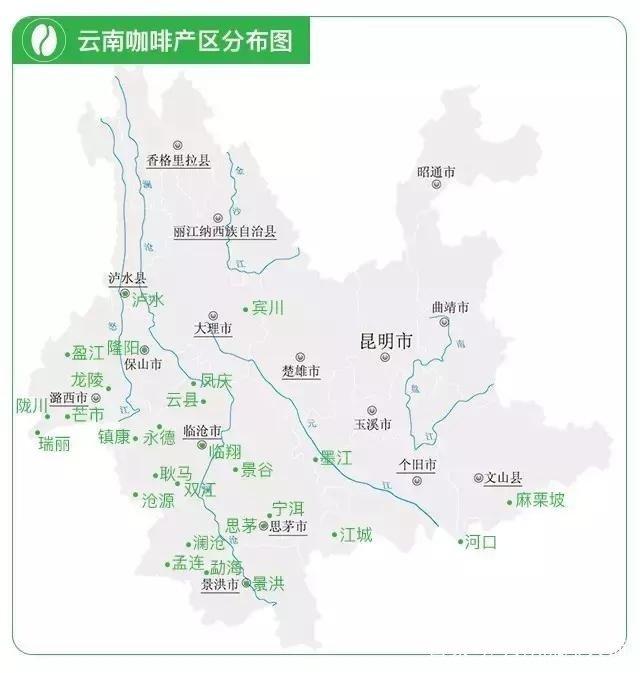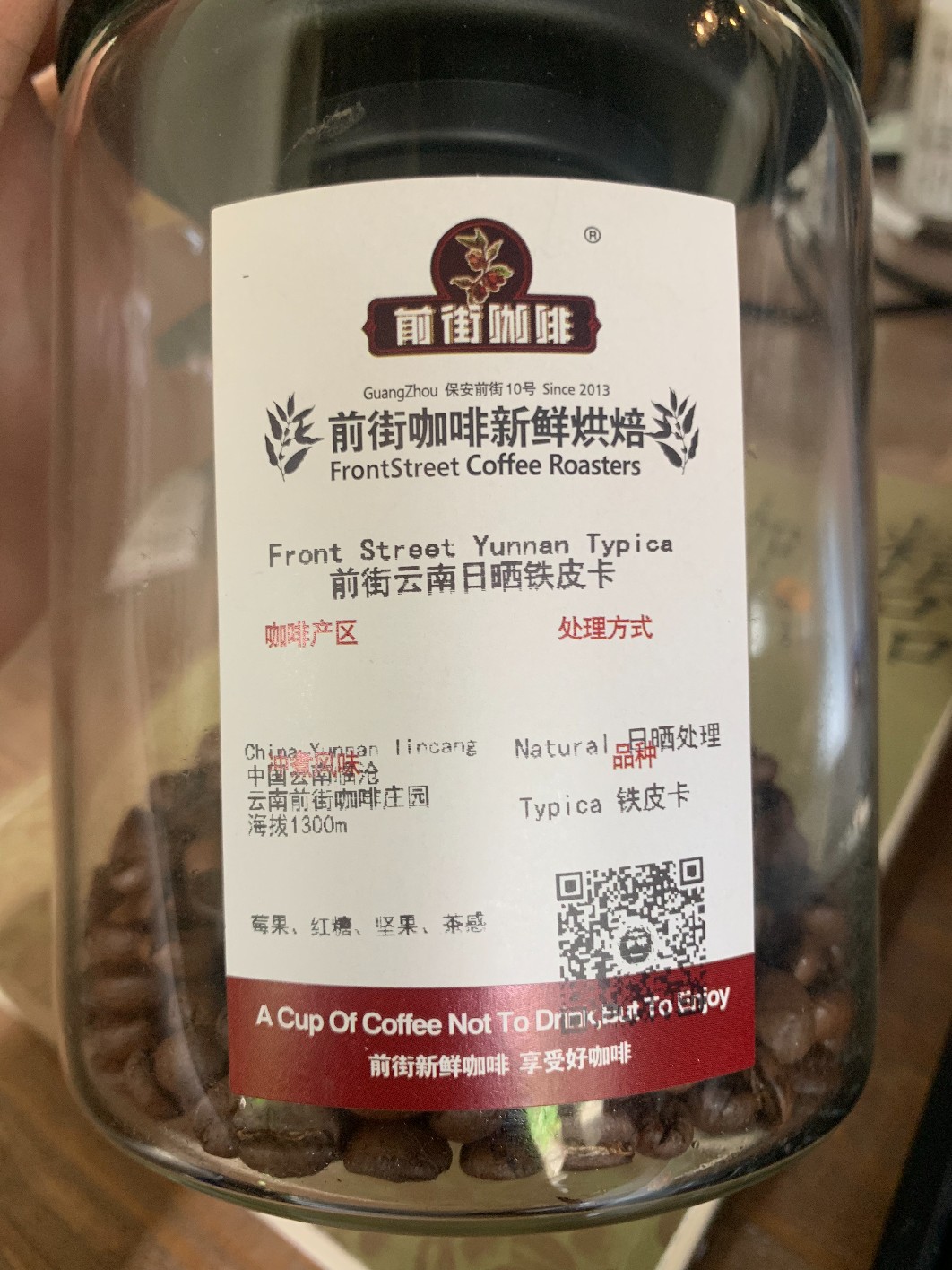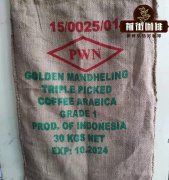Description of the flavor and taste characteristics of Yunnan coffee beans and the rise of Yunnan small grains in the growing area
Yunnan coffee beans are very popular in the coffee circle in recent years. More and more coffee lovers begin to try to contact Yunnan coffee beans and make a pertinent evaluation of them. In fact, before Yunnan coffee was paid attention to by the Chinese people, it was scattered in the mysterious villages of our country and existed in the demand for foreign exchange.

Qianjie Coffee has a coffee from Qianjie Manor in Lincang, Yunnan Province, which is tanned and has the flavor of berries, brown sugar and nuts.

History of development
In 1892, at the end of the Qing Dynasty, when China was in a semi-colonial and semi-feudal society, many foreign invaders and species entered China. And coffee also entered China with the French missionary Tian Deneng, coordinates: Zhukula Village, Dali, Yunnan. Up to now, there are still 24 coffee trees which are more than 90 years old in Zhukula Township. Mengzi Customs officially opened in 889. In 1905, in France, people opened Yunnan's first coffee bar, the Yunnan-Vietnam Railway Bar (a French-style cafe, a mixture of cafes and taverns, as well as the mainstream model of European cafes). In 1904, with the construction of the Yunnan-Vietnam Railway, a large number of foreign engineers, technicians and Westerners who came to Yunnan to search for gold poured into Yunnan, and the coffee culture that was popular in the West at that time also entered. The railway was completed on April 1, 1910. Coffee was planted along the railway from 1912 to 1915, and a small number of coffee trees remain today. In 1914, the border people of Jingpo nationality introduced coffee to grow in Nongxian Village, Ruili County. At that time, it was introduced as a courtyard cultivation for ornamental. Coffee seeds grow quietly in this land, although the coffee history of Nongxian Village is often hidden in the stream, but Nongxian Village imperceptibly affects the progress of Yunnan coffee and occupies a pivotal position. it is it that opened the door to the history of large-scale cultivation of Baoshan coffee later. In the spring of 1952, the scientific and technical personnel of Mangshi Branch of Yunnan Agricultural Experimental Field brought more than 70 kilograms of fresh fruit from Nongxian Village to Lujiangba in Baoshan City for trial planting, and found that they had good adaptability and good quality, and continued to grow. In the era of Sino-Soviet friendship, Baoshan coffee ushered in an opportunity for great development. Baoshan was exclusively for the Soviet Union, and Baoshan became the earliest area of coffee industrialization in Yunnan Province.
Yunnan coffee beans have a good sense of complexity and hierarchy, with rich overall, floral and citrus flavor, and outstanding malt flavor.
Coffee bean species
Katim, a hybrid variety infected with Robusta gene, is the main species of coffee beans in Yunnan. Yunnan Katim grows at a high altitude of 1500 meters, increasing aroma and purification, coupled with appropriate post-processing, the taste is very wonderful. Katim F6 is widely popularized and planted in Dehong, Baoshan, Pu'er, Xishuangbanna, Lincang, Wenshan, Yuxi and other places in Yunnan Province.
Yunnan small grain coffee originally refers to iron pickup, an early variety cultivated in Yunnan. Due to historical reasons, iron pickup has basically become the world of hybrid Katim since the 1980s, with an planting area of more than 8%. Therefore, it has become Yunnan small grain coffee.
problem
Compared with the coffee on the world stage, Yunnan coffee started relatively late. Coffee producers of different sizes are mixed and have different levels. Small coffee producers lack management and publicity, and their competitiveness is small and weak.
Important Notice :
前街咖啡 FrontStreet Coffee has moved to new addredd:
FrontStreet Coffee Address: 315,Donghua East Road,GuangZhou
Tel:020 38364473
- Prev

Description and difference of flavor and taste characteristics of old tiger Mantenin coffee beans in Lindong gold
The difference between Manning Coffee Manning Coffee is a kind of coffee often seen in coffee shops. Do you know where it comes from? Why is it called Manning? Let's learn about Manning with the editor today. Manning coffee from northern Sumatra in the western part of Indonesia near the Indian Ocean. In the 18th century, in order to break the Arab
- Next

The difference between individual Coffee and mixed Coffee the reason for blending Coffee and how to drink it
Friends who are new to coffee may not know the difference between individual coffee and blended coffee. Wonder why espresso likes to use mixed beans. Blending beans, as the name implies, refers to the mixing of two or more kinds of coffee beans, and the processed coffee beans are blended beans. Mixed beans are usually blended according to the following four purposes: 1. Long-term stable supply of beans: general coffee
Related
- Detailed explanation of Jadeite planting Land in Panamanian Jadeite Manor introduction to the grading system of Jadeite competitive bidding, Red bid, Green bid and Rose Summer
- Story of Coffee planting in Brenka region of Costa Rica Stonehenge Manor anaerobic heavy honey treatment of flavor mouth
- What's on the barrel of Blue Mountain Coffee beans?
- Can American coffee also pull flowers? How to use hot American style to pull out a good-looking pattern?
- Can you make a cold extract with coffee beans? What is the right proportion for cold-extracted coffee formula?
- Indonesian PWN Gold Mandrine Coffee Origin Features Flavor How to Chong? Mandolin coffee is American.
- A brief introduction to the flavor characteristics of Brazilian yellow bourbon coffee beans
- What is the effect of different water quality on the flavor of cold-extracted coffee? What kind of water is best for brewing coffee?
- Why do you think of Rose Summer whenever you mention Panamanian coffee?
- Introduction to the characteristics of authentic blue mountain coffee bean producing areas? What is the CIB Coffee Authority in Jamaica?

